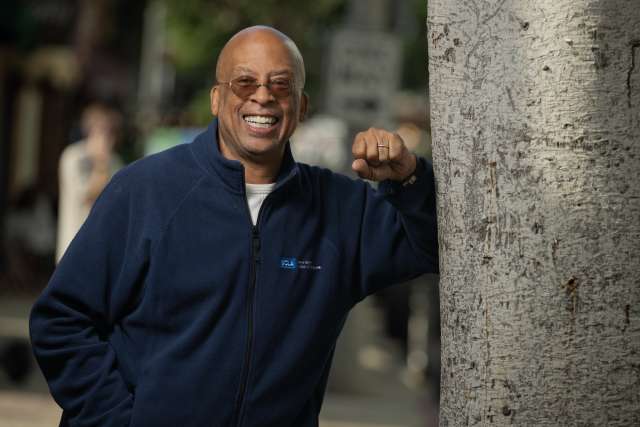Gregory Victorianne remembers a certain day when he was sitting down with one of his best friends on the porch drinking margaritas.
“That’s when he told me; he had AIDS,” Victorianne says. “It caught me off guard. My glass dropped.”
That friend died two weeks later, and the church he attended would not even hold his funeral service despite the fact that he had volunteered there for several years, Victorianne says.
“That changed everything for me. That was my launching pad.”
Nearly four decades later, Victorianne sits in his office at UCLA’s David Geffen School of Medicine speaking about that moment. It shaped his transformation into the man he is today: a sexual health activist, community organizer, researcher, educator, and a vocal advocate for HIV prevention.
He focuses on the use of multi-level (social, structural, biomedical and clinical) interventions to reduce the acquisition and transmission of HIV among Black and Brown men having sex with men and women, who are disproportionately burdened by the epidemic.
He has successfully built relationships with Los Angeles communities – in particular Black same-gender-loving men -- a population to which he belongs. He has led HIV prevention efforts in Boston and helped support research in Chicago as well as here in Los Angeles.
And for the last five years, he has served as the Recruitment and Retention Coordinator for the , a community-based research study. The MEPS project has been testing a new way to help people without HIV to stay negative, avoid other infections and receive the services they need after being released from jail, prison or detention.
An agent of positivity
The MEPS study is a collaboration between UCLA, the Los Angeles Centers for Alcohol and Drug Abuse, Charles R. Drew University of Medicine and Science, and other Los Angeles-based treatment facilities and recovery bridge houses, headed by , Ph.D.

A professor with the David Geffen School of Medicine, Dr. Harawa directs the HIV research core for the Center for HIV Identification, Prevention, and Treatment Services and the CTSI TL1 pre-/post-doctoral fellowship program. She is also the associate director for HIV Research at Charles R. Drew University of Medicine and Science.
Victorianne works on the recruitment and retention of community members for the MEPS study, which focuses on gay, bisexual men as well as transgender women who have been incarcerated. Black and Latino people are overrepresented within this vulnerable, stigmatized population, Dr. Harawa says. Victorianne’s vast experience and personality have been invaluable.
“He is outgoing and conveys positivity,” Dr. Harawa says. “When he talked with participants, he would affirm the good things in their lives. And they get the sense that this is someone they are going to interact with, who is going to speak a positive word. This is good for populations that are stigmatized and don’t have those positive interactions very often.”
Early on, the retention levels for the study were very low, but Victorianne was instrumental in changing that, she says.
This project posed a unique set of challenges Victorianne says he found daunting even with his experience and deep knowledge of the community, particularly the people being released from jail. Sometimes, it was as if he was working with an invisible group of people, he says.
“Some often go in and out of jail,” he says. “When they get out, their phone numbers change. They may not have alternate contacts because they may have burned bridges with families and friends. They don’t have email. They’re not on social media. Some of them have mental illnesses and substance abuse issues.”
Initially, the goal was to recruit directly from Men’s Central Jail, but the COVID-19 pandemic prevented the team from doing so. They had to pivot and recruit from recovery bridge and treatment facilities. It was hard, draining, work, sometimes frustrating and often sad.
“When they get lost, it’s a challenge,” Victorianne says. “What also hurts a lot is when they cross over. We lost three individuals to drug overdoses. You look at what you could’ve done. What could I have done better? And you have to take heart in the fact that you followed protocols and you did your best.”
The rewards have given him hope as well. Through the MEPS study, Victorianne says, many participants have been able to maintain a healthy lifestyle after their release.
“We’ve seen people get employed, go back to school, reestablish relationships with their families and loved ones,” he said. “They would tell me they got an ID card, a key step in them being able to access healthcare and social services.”
But what gave him great joy, Victorianne says, was to hear participants say they went to the doctor, got PrEP (pre-exposure prophylaxis) to prevent HIV, or got tested for sexually transmitted infections.
“To me, when they say they are taking care of themselves and getting health care – that is success,” he says.
Representation always matters
Representation absolutely matters when it comes to HIV research, prevention and community engagement efforts, Victorianne believes. In fact, he first took note of the gap because of his experience participating in a clinical trial in Boston.
“I was dressed down and showed up in a hoodie,” he says. “I had a bad experience with how I was treated.”
Victorianne pivoted into this area of work after quitting his job at a law firm.
“One of my mentors encouraged me to speak for those who can’t,” he says. “I thought about all the friends I had lost to AIDS. This was my calling.”
In 1992, Victorianne and a friend, Joseph Benson, self-published a notorious guerilla ‘zine called Buti Voxx, featuring Black, same-gender-loving erotica. He admits it was “in-your-face, raw sex stuff,” but says it also included sex education and important HIV/STI prevention information for readers.
The ‘zine helped platform the voices of Black writers who were struggling to get published elsewhere, he says. The publication’s illustrations served as HIV prevention messages as well.
“It was truly liberating work. It is important for everyone to understand that sex and sexual health are pieces that go together. They overlap.”
When it comes to recruiting participants from the community, Victorianne tries to infuse every foray with sensitivity, but also his trademark candor.
“When I’m with study participants, I try to engage them in the real sense,” he says. “I tell them I’m HIV-negative, that I’m on PrEP. I make that human connection so they can relate. I tell them, ‘Man, I was where you are right now.’ If they have questions or skepticism about the research, we talk about it.”
Victorianne says he tells participants that they are “not just a statistic, but a person we want to help.” He explains to them that the study was designed by Dr. Harawa, an African American woman.
“I let the people know who designed the study so they know they are people like us,” he says. “That is so important.”
Future of HIV research and prevention
Victorianne believes researchers must not only partner with grassroots organizations to help them connect to hard-to-reach communities, but also treat those community members with respect and dignity, and compensate them fairly for their time and efforts.
It is also important to make sure study participants have a good experience at the clinic, he says.
“This is a population that has been kicked to the curb. If we want to retain them, we need to treat them well. When they get to the clinic, give them water or juice. If you’re going to be late, let them know because most of them take public transit. And make sure they get paid because that $25 or $30 they get that day might be the only money they see that day, that week or that month.”
While he is happy to see HIV infection rates declining, Victorianne would also like to see more research and prevention work done within communities of color and by researchers of color.
“We should not have one culture dominating this field,” he says. “People focused on research and prevention need to come together. It shouldn’t matter if someone has a PhD or not.”
For Victorianne, it has been a long, rewarding, sometimes painful journey. On those tough days, he makes a trip to an Inglewood cemetery where many of his friends who died from AIDS lay at rest.
There are some days, Victorianne says, when you just need to be with your sisters and brothers.



